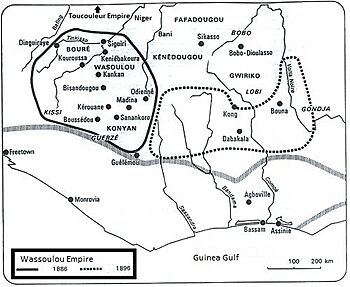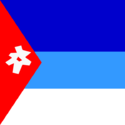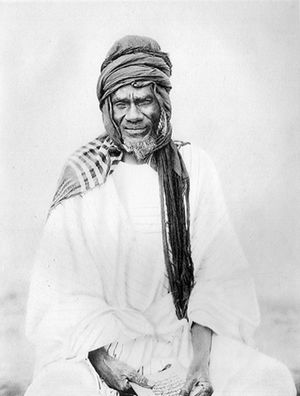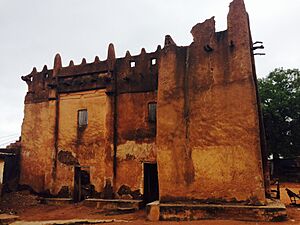Wassoulou Empire facts for kids
Quick facts for kids
Wassoulou Empire
|
|||||||||||||||
|---|---|---|---|---|---|---|---|---|---|---|---|---|---|---|---|
| 1878–1898 | |||||||||||||||
|
Flag
|
|||||||||||||||

Wassoulou Empire at its peak
|
|||||||||||||||
| Capital | Bissandugu | ||||||||||||||
| Common languages | Arabic (official) Mandinka |
||||||||||||||
| Religion | Sunni Islam | ||||||||||||||
| Government | Monarchy | ||||||||||||||
| Faama | |||||||||||||||
|
• 1878–1898
|
Samori Ture | ||||||||||||||
| History | |||||||||||||||
|
• Established
|
1878 | ||||||||||||||
|
• Disestablished
|
29 September 1898 | ||||||||||||||
|
|||||||||||||||
| Today part of | Côte d'Ivoire Guinea Mali Sierra Leone |
||||||||||||||
The Wassoulou Empire was a powerful but short-lived state in West Africa. It existed from about 1878 to 1898. Its lands covered parts of what are now Mali, Guinea, Ghana, and Ivory Coast. The capital city was Bissandugu. This empire was also known by other names, like the Mandinka Empire or Samory's Empire, named after its founder.
Contents
History of the Wassoulou Empire
How the Empire Began
After the leader of the Toucouleur Empire, Umar Tall, died in 1864, his empire split apart. This allowed new local leaders to become strong. One of these important leaders was Samory Toure.
Samory Toure started with a small group of warriors. He slowly gained control over the Toron region. He used both fighting and talking to make alliances. He teamed up with powerful families and leaders, including those in Bissandougou. From 1866 to 1873, Samory's army grew a lot. Many people joined him because of his success.
In 1875, the Bate Empire asked Samory for help. They wanted to fight against their non-Muslim neighbors. Samory agreed and joined forces with them. Together, they conquered important towns like Kouroussa and Norassoba. Samory also made friends with other leaders. He formed an alliance with the Imamate of Futa Jallon in 1879.
The army took control of the Bure gold mining area. This made the empire financially strong. By 1878, Samory Toure declared himself Faama, or Emperor, of the Wassoulou Empire. He made Bissandugu his capital. In 1884, he took the Islamic title of Almamy.
Fighting European Colonizers
In the late 1800s, European countries began to take over parts of Africa. This period was called the Scramble for Africa. The Wassoulou Empire often fought against France.
In 1881, a French commander sent a message to Samory Toure. He said that Kiniéran was now under French protection. Samory was not impressed and attacked the town in February 1882. A French army arrived later and chased Samory's army. They fought at Samaya. The Wassoulou warriors, called sofas, usually charged forward. But against French weapons, this caused many losses. Samory quickly changed his tactics. He used guerrilla warfare and quick cavalry attacks. His army pushed the French back to the Niger River. This victory made Samory famous. People saw him as an African leader who could stand up to the Europeans. This greatly increased his power and attracted more fighters.
In 1883, the French built a fort in Bamako, an important town. Samory's brother, Kebe Brema, led an attack near Bamako. They fought two battles at Woyo Wayanko creek. Kebe Brema won the first, but had to retreat later.
In 1885, Samory Toure tried to make Wassoulou a British protectorate. He sent men to Freetown in Sierra Leone. The British said no because they wanted to avoid conflict with France. However, they allowed more trade, including selling rifles to Samory's army.
Later in 1885, a French group tried to take the Buré gold fields. Samory fought back and forced them to leave. The French then had to sign a treaty in 1886. This treaty set the Niger River as the border between France and Wassoulou.
Battles with Kenedougou
Around the same time, there was fighting between the Wassoulou Empire and the Kenedougou Kingdom. Both sides raided each other's lands. The Kenedougou army tried to start a rebellion in the Wassoulou region. There was also a lot of hunger and instability. When Samory's forces started making people convert to Islam and destroying local holy places in 1885, the people rebelled. Samory sent Keme Brema to stop the rebellion. He did so very harshly. By 1887, the rebels were forced to give up.
Once the Wassoulou region was back under his control, Samory signed another treaty with the French. The terms were similar to the earlier treaty. With the French now supposedly allies, Samory focused his army on Kenedougou. He began to attack their capital, Sikasso, in April. This attack lasted for 15 months.
The attack on Sikasso was a turning point for the Wassoulou Empire. It marked the beginning of its decline. The Tata of Sikasso was a very strong defense system. Samory did not have cannons to break through it. His supplies had to be carried by people from Bissandougou. The roads became muddy during the rainy season. Many soldiers got sick and died, including Kebe Brema. Meanwhile, the French were not acting like allies. They built a fort and blocked trade. This hurt the Wassoulou economy. A rumor spread that Samory was dead, and another big rebellion started. By 1888, Samory had to give up the attack. His hungry soldiers attacked the Wassoulou region again, killing any rebels they found.
The Fall of Kankan and Bissandougou
In February 1889, Samory and the French signed another treaty. This treaty gave the French more control further south. The Empire was weak after the Sikasso attack. Also, the British stopped selling them modern guns.
On March 10, 1891, a French force attacked Kankan by surprise. They expected to defeat Samory quickly. Samory knew his forts could not stop French cannons. So, he changed his strategy. He used a "scorched earth" tactic. This meant destroying everything useful before the French arrived. The French captured Kankan and then a deserted Bissandougou. But Samory had left nothing for them to take.
Another French commander arrived in 1892. He led an attack on Bissandougou. The French set up garrisons there. Samory held a meeting where they decided to move the empire east. They would destroy each area before leaving to slow down the French.
In 1893, the French captured Faranah. They also blocked supply routes to Liberia and Sierra Leone. These were Wassoulou's main sources of modern weapons. This forced Samory to use a longer route through the Gold Coast. The western parts of the empire surrendered. Samory Toure's empire in the Manding region was now gone.
Moving East: Kong and Bouna
Samory moved his base east in February 1895. His goal was to control Kong, an old trading city. The French also wanted Kong. A French army column tried to secure the city. But the local people fought back. The French were forced to retreat, and Kong joined Samory in April. The new Wassoulou Empire in the east had almost two years without major French attacks.
Samory gave Kong many special rights. But trade with the coast, controlled by the French, slowed down. Samory wanted to move further east to get more guns. When he retreated from a French force, the people of Kong saw it as weakness. They started to intercept gun shipments and invited the French back. When the people of Kong openly rebelled, Samory destroyed the city in May 1897.
The French also tried to control Bouna. They wanted to keep Samory and the British apart. A British force tried to take Bouna but was defeated. Later, a French column tried to negotiate for Bouna. But its commander was killed, and the column was destroyed in August 1897. This restarted the war between Wassoulou and the French.
The fall of the Kenedougou capital, Sikasso, in May 1898 allowed the French to focus their attacks on Wassoulou. Samory was forced to move again, this time towards Liberia. He hoped to live off the land as he marched. But the mountains, hostile locals, and French attacks made it a disaster. Thousands died from hunger. Using information from former soldiers, a French captain surprised Samory's forces in September 1898. He captured Samory without a fight. With his capture, the Wassoulou Empire ended.
How the Empire Was Run
Government Structure
At its strongest, the Wassoulou Empire was divided into 62 smaller areas called cantons and 10 larger provinces. About 300,000 people lived there, from many different groups. The main officials were called keletigi, meaning "war chief." They were in charge of both the army and making sure justice was served in their province. Taxes were generally low.
An important part of Wassoulou's government was the regular grand councils. These meetings brought together all the important leaders of the empire. They made big decisions and organized new conquered lands. For example, in 1875, a council in Bissandougou made it the capital and declared Samory Toure as faama. In 1884, a council made Islam the official state religion.
Talking with Other Countries
Samory Toure had a diplomatic office in Freetown. This helped protect trade caravans and kept guns flowing from the British colony to the Wassoulou Empire. The French also sent and received diplomats from Wassoulou. After a treaty in 1886, Samory's son, Djaoulen Karamo, went to Paris. He liked French culture and later wanted to make peace instead of war. But when he tried to secretly negotiate in 1894, he was starved to death.
Wassoulou had a very good spy network. The French called it the "African telegraph." Young soldiers were sent to French posts to gather information. Sometimes they worked as servants in officers' homes to listen to important talks. Merchants also gathered information and passed it to Wassoulou leaders.
Areas near Wassoulou's borders were often dangerous. Villages were often attacked by different groups.
The Wassoulou Army
The army was the most important part of the Wassoulou government. It was involved in all administrative and political matters. The army had modern firearms and a clear structure. It had infantry (foot soldiers) called sofa and cavalry (soldiers on horseback). Young, uncircumcised boys, called bilakoro, served as helpers for the soldiers.
In 1887, Samory had about 30,000 to 35,000 infantry and 3,000 cavalry. The cavalry was organized into groups of 50. There was also a reserve force. One out of every ten men from each village was part of this reserve. This meant each of the empire's 10 provinces could provide 10,000 men. Even when moving east, the Wassoulou army had about 12,000 infantry and 2,000 cavalry. The total group, including families, was about 120,000 people.
The best-armed troops fought the French with modern rifles. Other soldiers used older rifles to conquer new land to the east. This new land served as a safe place to retreat. This system allowed Samory to retreat into organized territory, leaving no food for the French, for seven years.
The best soldiers used the Gras rifle. Local blacksmiths learned to fix and even build these rifles. However, they could not make enough for the whole army. The empire had a firearms industry with 300-400 blacksmiths. They made about 12 guns a week and 200-300 cartridges a day. Most weapons came from British Sierra Leone. However, they never got cannons.
The Wassoulou army was well-organized and disciplined, similar to European armies. They had similar communication and rules. Soldiers who ran away from other armies were hired as trainers. Strict rules, along with rewards and punishments, kept order in the army.
Economy of the Empire
Most people in the empire were farmers who grew their own food. The state also traded a lot with cities on the coast. They sold things like ivory, wax, animal hides, rubber, and gold. These goods were carried by enslaved people, who were also sometimes sold. The money from these sales bought weapons and ammunition for the army. Caravans also went north to buy horses.
As the French put more pressure on Wassoulou, the empire relied more on the slave trade to pay for the war. By the 1880s, the empire's economy depended heavily on goods taken from conquered lands and the internal slave trade. This trade involved war captives or refugees selling themselves into slavery.
Society and Religion
After Islam became the official state religion in 1884, it helped unite the empire's diverse people. Mosques were built in many conquered areas. A justice system based on Islamic rules was set up. Older, non-Islamic practices were stopped. The state supported schools that taught the Quran. Samory Toure often visited these schools. He would talk to students, reward good teachers, and scold bad ones.
In areas where people strongly followed older traditions, they saw Islamization as a threat. After 1885, rebellions became more common. These had to be put down while fighting the French. Overall, Samory Toure's harsh methods of spreading Islam did not work well. Many of these communities only converted to Islam after the Wassoulou Empire fell.
Images for kids
 | Kyle Baker |
 | Joseph Yoakum |
 | Laura Wheeler Waring |
 | Henry Ossawa Tanner |





